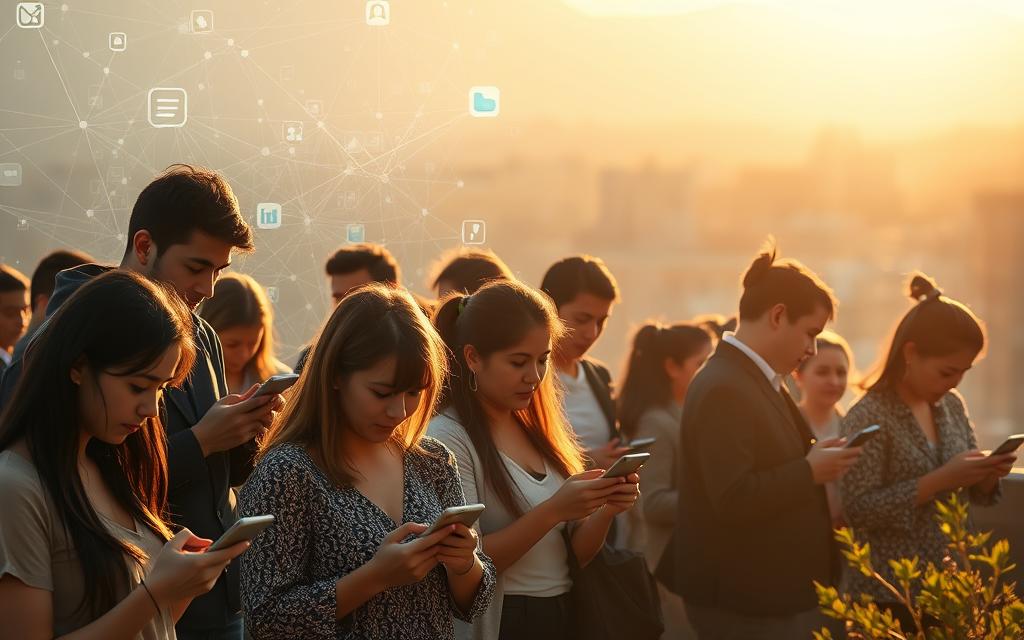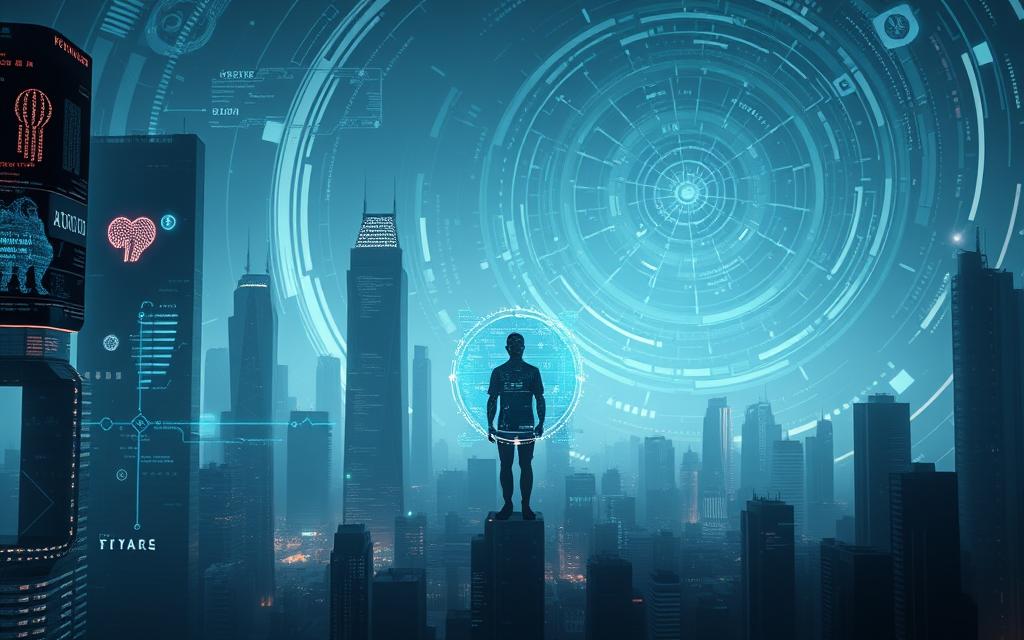Our digital devices are now a big part of our lives. Smartphones, laptops, and social media shape how we spend our days and interact with others.
This constant connection has both good and bad sides for our wellbeing. It gives us easy access to information and friends. But it also brings new pressures that older generations didn’t face.
The line between work and personal life has gotten very blurry. Many find it hard to deal with the psychological effects of social media. They feel they must always be available.
Research shows these modern issues are different from old mental health problems. Studies link screen time to various wellbeing issues. You can read more about this in this comprehensive review of technology’s impact.
It’s important to understand how our digital lives affect our mental health. This knowledge helps us tackle today’s digital mental health challenges.
The Digital Transformation of Psychological Landscapes
Digital innovation has changed how we view mental health and psychology. Technology has opened new doors for both experts and patients. It has turned old methods into new digital ones.
Evolution of Technology in Psychological Practice
Computers have changed psychology a lot. At first, they were just for simple tests and diagnosis. Now, the field is much more advanced.
Today, we use smart digital tools and apps. Smartphones and tablets help us monitor and collect data anytime. This is a big step forward.
Now, mental health care is more personal. Digital tools offer treatments that fit each person’s needs. This is a big change from the old ways.
Shifting Paradigms in Mental Health Care
The COVID-19 pandemic made teletherapy very important. It showed how technology can help when we can’t meet in person. This was a big change.
Teletherapy benefits include reaching more people, like those in rural areas. It also makes scheduling easier and saves time. Many find it more comfortable to talk in their own space.
But, there are also new problems. Technology can lead to addiction and feeling tired from too much screen time. Mental health experts now face new challenges.
Collecting data has changed how we understand mental health. Mobile devices give us a lot of data on behaviour. This helps doctors make better treatment plans.
This change is not just about treatment. It’s also about stopping problems before they start. Digital tools help find people at risk early. This is a big shift in how we think about mental health care.
Positive Psychological Impacts of Technological Advancements
Technology has changed how we support mental health, opening up new ways to improve wellbeing. Digital tools now make care more accessible and tailored to each person.
Enhanced Access to Mental Health Resources
Before, getting help was hard due to location and time. Now, digital platforms have made mental health support easy to reach. Anyone with internet can access it.
Teletherapy and Online Counselling Platforms
Virtual therapy has changed how we get help. These online counselling platforms let you talk to experts from home. It’s safe and easy.
It means you can keep up with treatment even when you move. And, you get help right away when you need it most.

Mobile tech lets us take charge of our mental health. There are many mental health applications with proven methods for everyday use.
These apps often have:
- Symptom tracking and mood diaries
- Cognitive behavioural therapy exercises
- Mindfulness and meditation guides
- Personalised coping strategy recommendations
Studies show using these apps regularly can really help with anxiety and depression. They’re great alongside traditional therapy.
Data-Driven Psychological Insights
Technology lets us gather data on behaviour that was hard to get before. Smartphones and how we use them give clues about our mental state.
By tracking our behaviour, we can spot early signs of mental health issues. This means we can act fast to prevent bigger problems.
Looking at big data helps find common patterns. This leads to treatments that really work for each person. It’s a forward-thinking approach to mental health care.
Negative Psychological Consequences of Technology Use
Technology has many benefits for our mental health. But, using it too much can cause big problems. It can mess with our mental health and how we think.
Digital Addiction and Its Psychological Effects
Digital addiction is a big worry. It makes people keep using digital devices too much. This can mess up their sleep, social life, and work or school.
Social Media Dependency Patterns
Social media can make us feel like we’re missing out. This can lead to checking our phones all the time. Too much social media can make us feel sad and lower our self-esteem, mainly in young people.
Platforms that focus on images can also be harmful. They can make us feel bad about our bodies. Seeing perfect images all the time can make us feel like we’re not good enough.
Video games and streaming services use tricks to keep us hooked. They use the same tricks as slot machines to make us want to keep playing. This can lead to addiction.
Gaming addiction can cause:
- Neglect of personal hygiene and health
- Withdrawal from family and social activities
- Academic or occupational difficulties
- Financial problems from in-game purchases
Technology-Induced Anxiety and Stress Disorders
Today’s technology makes us feel stressed in new ways. The constant alerts and need to be always available can cause anxiety. This is called technostress.
A study on the negative effects found that technology can make us anxious in different ways. This can lead to serious problems if not dealt with.
These anxiety issues can turn into serious problems if not treated. Here’s a table showing how much screen time can affect us:
| Screen Time Duration | Psychological Effects | Recommended Digital Wellbeing Strategies |
|---|---|---|
| 2-4 hours daily | Mild attention fragmentation, occasional sleep disruption | Scheduled breaks, notification management |
| 4-6 hours daily | Moderate anxiety symptoms, reduced attention span | Digital detox periods, app usage limits |
| 6+ hours daily | Severe addiction patterns, significant sleep disorders | Professional intervention, complete usage tracking |
It’s important to find ways to deal with the negative effects of technology. How much someone is affected can vary a lot. What works for one person might not work for another.
Knowing how technology affects us helps experts find better ways to use it. They can help make sure technology helps our mental health, not hurts it.
How Does Technology Impact Psychology Through Specific Platforms
Digital platforms change how we think and feel. Each one has its own way of affecting our minds. Knowing how they work helps us use technology wisely.

Social Media’s Influence on Self-Perception
Social media changes how we see ourselves and others. It creates new ways to judge ourselves and others. Seeing perfect lives online can deeply affect our mental health.
Instagram and Body Image Concerns
Instagram’s focus on looks can harm our body image. Studies show it can make us see ourselves differently. The pressure to look perfect is huge.
Being on Instagram a lot can make us unhappy with our bodies. This is true for young people. Editing photos before sharing makes things worse.
Comparing our real lives to others’ perfect photos can hurt us. The algorithm on Instagram makes this worse by showing us certain types of beauty.
Facebook and Social Comparison Theory
Facebook is great for comparing ourselves to others. We often feel less happy when we see others’ best moments. This can make us feel less satisfied with our lives.
Facebook makes us want to show only the best parts of our lives. This sets an unrealistic standard for what’s normal. Looking at others’ achievements can make us feel down.
“Social media platforms have become modern comparison engines, constantly providing metrics against which users evaluate their self-worth.”
Facebook’s features like likes and shares make us feel like we’re competing. This can affect our self-esteem in different ways. How much it affects us depends on how much we value social approval.
Smartphone Usage and Cognitive Changes
Smartphones have changed how we think and remember things. They affect our attention, memory, and even sleep. Being always connected has big mental costs.
Smartphones make it hard to focus for long. We check our phones hundreds of times a day. This breaks our ability to concentrate deeply.
We rely on our phones to remember things. Why bother remembering when you can just Google it? This changes how we learn and remember.
Using phones in the evening messes up our sleep. The blue light they give off stops us from feeling tired. This can make us feel less sharp and less able to control our emotions.
| Cognitive Aspect | Before Smartphones | After Smartphones | Psychological Impact |
|---|---|---|---|
| Attention Span | Longer sustained focus | Frequent task switching | Reduced deep work capacity |
| Memory Formation | Active information retention | Digital dependency | Weaker recall abilities |
| Sleep Patterns | Natural circadian rhythms | Blue light disruption | Poorer rest quality |
| Social Interaction | Direct communication | Mediated exchanges | Altered social skills |
Smartphones have changed how we think and feel. They’ve become part of our minds. Knowing this helps us use them better.
The constant alerts make us always on edge. This can make us feel anxious. It’s important to control our phone use for our mental health.
Conclusion
Technology has a big impact on psychology, showing both good and bad sides. It gives us new ways to get help for our minds and helps us understand them better. But it also brings problems like getting too caught up in screens and feeling anxious.
To use technology wisely, we need to be careful. Set limits on how much time we spend looking at screens. Stay focused on the moment by being mindful online. And make sure to spend time with people face-to-face to keep our emotions healthy.
The way technology changes healthcare is always moving forward. We might see even better apps for mental health in the future. These could work better with doctors and help people more. But we also need rules to make sure these tools are safe and work well.
Technology itself isn’t good or bad. It’s how we use it that matters. Let’s use digital tools in a way that helps us, not hurts us. This way, we can stay well in a world that’s always changing.
FAQ
How has technology influenced the way mental health care is delivered?
Technology has changed mental health care a lot. It has made online therapy and counselling easier. This means people can get help without being in the same place.
The COVID-19 pandemic made digital care even more popular. It changed how doctors work and what patients expect from care.
What are some positive psychological impacts of modern technology?
Modern tech has made it easier to find mental health help. There are apps for managing your mind and training your brain. These tools use data to help in a way that feels personal.
Smartphones can also track how you behave. This can help spot mental health problems early. It helps you take care of your mind before things get worse.
Can technology use lead to negative psychological effects?
Yes, too much tech can be bad for your mind. It can lead to addiction, like being too hooked on social media or games. It can also cause depression, anxiety, and stress.
Being always connected and getting too many notifications can make things worse. But how it affects you depends on you and your situation.
How does social media affect self-perception and mental wellbeing?
Platforms like Instagram can harm how you see yourself. Editing selfies and comparing yourself to others can lower your self-esteem. Facebook can also make you feel worse by making you compare yourself to others.
What cognitive changes are associated with smartphone usage?
Using smartphones too much can mess with your focus and memory. It can also disrupt your sleep. This can hurt how well you think.
Mobile devices always interrupting you can cause these problems. It’s hard to focus when you’re always being distracted.
Is technology itself harmful to psychological health?
Technology isn’t inherently bad. It depends on how you use it. It can be addictive and cause anxiety, but it also helps a lot.
It makes mental health support easier to find and gives you insights tailored to you. Using tech wisely is important for your wellbeing.
How can individuals mitigate the negative effects of technology on mental health?
To avoid tech’s bad effects, set limits on when you use devices. Practice being mindful of your digital use. Spend time with people face-to-face.
Use tech to help your wellbeing, not harm it. New apps and rules might help make tech use healthier in the future.







